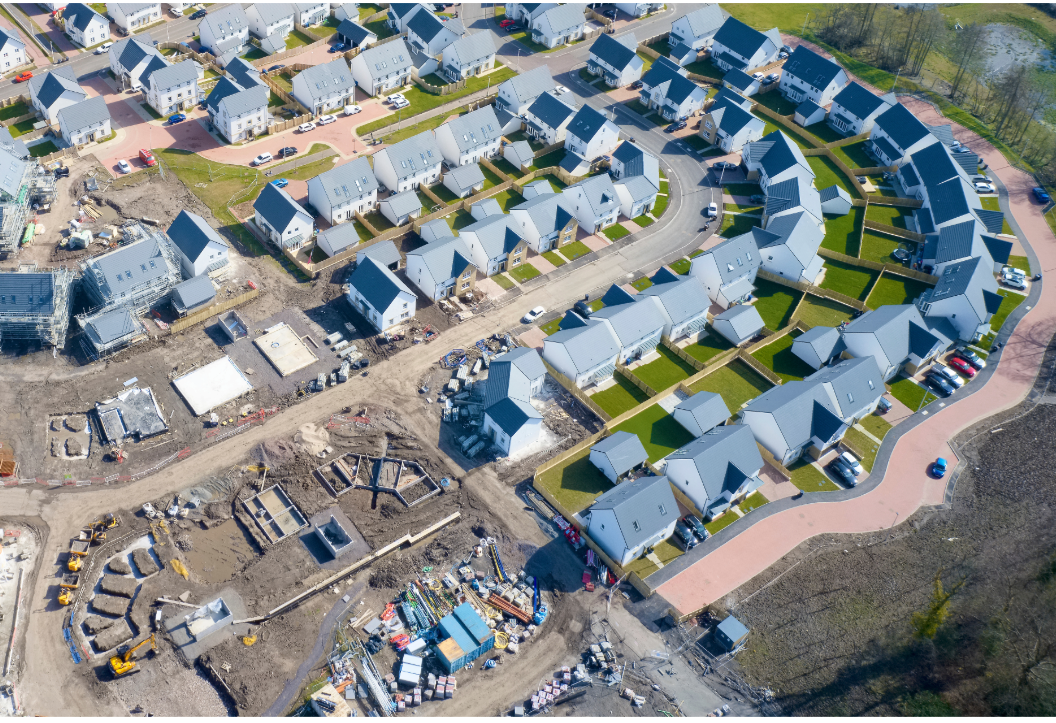The SME Housebuilding Renaissance.
The SME housebuilding sector stands at a pivotal crossroads, with recent government reforms signalling opportunities for growth while persistent structural challenges threaten to undermine such efforts. After decades of decline that saw SME housebuilders' numbers shrink by 65% over 30 years, the sector now faces a critical juncture where strategic talent acquisition will determine which companies capitalise on emerging opportunities and which fall victim to an increasingly complex operating environment. The convergence of streamlined planning processes, dedicated funding mechanisms, and ambitious housing targets creates a landscape where having the right leadership, technical expertise, and operational talent becomes the differentiating factor between market leaders and casualties of an unforgiving industry transformation.
Current Market Landscape: A Sector in Transition.
The SME market presents a compelling paradox of opportunity and adversity that defines the contemporary development landscape. Recent industry analysis reveals that approximately 70% of SME housebuilders report greater operational difficulty compared to five years ago, highlighting the mounting pressures facing smaller developers in an increasingly consolidated market. This deterioration occurs against a backdrop where just 10 companies now control 60% of new home construction, fundamentally altering the competitive dynamics that once allowed SME builders to thrive.
Despite these challenges, SME housebuilders continue to demonstrate remarkable resilience and market relevance. According to the Competition and Markets Authority's 2024 analysis, thousands of SME housebuilders across the UK collectively deliver over 50,000 units annually, representing a significant contribution to national housing supply. The Federation of Master Builders estimates that under optimal conditions, this sector could increase output fivefold, underscoring the substantial untapped potential within the SME development community. This capacity for growth positions SME builders as critical players in addressing the UK's chronic housing shortage, which sees annual supply falling approximately 100,000 units short of demand.
The market dynamics reveal a sector characterised by local expertise, community focus, and operational flexibility that larger volume builders often cannot match. SME housebuilders excel in developing smaller, tailored projects that major developers typically overlook, providing essential housing diversity and community-specific solutions. Strong local connections and intimate understanding of regional markets enable them to identify and capitalise on development opportunities that might be dismissed by larger competitors focused on scalable, high-volume projects.
Government Initiatives: Unprecedented Support Framework.
The landscape for SME housebuilders transformed dramatically in May, when the government announced a comprehensive support package specifically designed to revitalise the sector and unlock its growth potential. These reforms represent the most significant policy intervention in decades, addressing longstanding systemic barriers that have constrained SME development activities. The introduction of streamlined planning procedures for developments up to nine homes eliminates traditional committee-based decision-making in favour of expert planning officer assessments, fundamentally accelerating the approval process that has historically plagued smaller developers.
The establishment of a new 'medium site' category for developments containing 10–49 homes introduces simplified regulatory frameworks that reduce both compliance costs and administrative burden. This category provides exemptions from the Building Safety Levy and implements simplified Biodiversity Net Gain requirements, directly addressing two significant cost centres that have disproportionately impacted SME operations. The government's recognition that smaller sites faced identical planning hurdles as major developments despite vastly different resource constraints demonstrates an understanding of the sector's operational realities.
Homes England's commitment to release land exclusively to SME developers represents a fundamental shift in public sector land disposal strategy. This policy intervention directly addresses one of the most persistent barriers facing smaller developers: access to viable development sites. The forthcoming National Housing Delivery Fund, scheduled for confirmation at the June 11 Spending Review, promises long-term financing solutions including revolving credit facilities and lending alliances specifically structured for SME requirements. The Small Sites Aggregator pilot programme in Bristol, Sheffield, and Lewisham offers an innovative approach to unlocking otherwise unviable small plots while attracting private investment for social housing provision.
Persistent Challenges: Structural Barriers to Growth.
Despite governmental support initiatives, SME housebuilders continue confronting formidable challenges that threaten to undermine growth potential and operational sustainability. Planning system dysfunction remains the predominant constraint, with delays in securing planning permission and discharging planning conditions consistently ranking as the top barriers to increased housing delivery. The FMB's 2024 Housebuilders' Survey reveals that communication with planning officers represents a major hindrance to new home construction, suggesting that process improvements require not just policy reform but fundamental capacity building within local planning authorities.
Access to suitable development land continues plaguing the sector, with 59% of SME housebuilders identifying lack of available and viable land as their primary constraint. This challenge intensifies as 62% of respondents report decreasing opportunities for small site development, indicating a market where land suitable for SME operations becomes increasingly scarce. The consolidation of land holdings by major developers and institutional investors creates artificial scarcity that disproportionately impacts smaller operators lacking the financial resources to compete for prime development sites.
Financial constraints compound operational difficulties, with 46% of SME housebuilders citing access to finance as a major barrier to expansion. Traditional lending institutions often struggle to understand the SME development model, leading to inappropriate lending criteria and limited product availability. The complexity of development finance requirements, combined with risk-averse lending practices following previous market downturns, creates funding gaps that prevent viable projects from proceeding. These financial challenges become particularly acute when coupled with extended development timelines and uncertain planning outcomes that increase project risk profiles.
Technical and regulatory complexity has expanded significantly, creating compliance burdens that smaller developers struggle to manage effectively. The evolution of building regulations, environmental requirements, and safety standards demands specialist expertise that many SME operations cannot afford to maintain in-house. This technical complexity necessitates either expensive external consultancy or recruitment of specialised personnel, both of which strain the financial resources of smaller development companies.
Skills Crisis: The Talent Acquisition Imperative.
The construction industry's skills shortage represents perhaps the most critical threat to SME housebuilding sector growth, with 44% of builders identifying skilled worker shortages as a major barrier to increased housing delivery. This figure represents a concerning upward trend from 42% in 2017, suggesting that talent scarcity continues intensifying despite industry recognition of the problem. Forward-looking analysis indicates that skills shortages may overtake access to finance as the primary constraint on sector growth, fundamentally altering the strategic priorities for SME development companies.
The skills crisis manifests across multiple operational dimensions, and across all disciplines. For example, technical specialists in areas such as planning, environmental compliance, and building regulation interpretation become increasingly difficult to source and retain. The sector's reliance on EU workers, who represent approximately one in ten construction workers, faces additional uncertainty following Brexit implementation.
Leadership quality emerges as a critical differentiator in navigating the complex operational environment facing SME housebuilders, for example, companies that have experienced Finance Directors with strong relationships within the development finance community provide competitive advantages in securing funding at favourable terms. These senior appointments often determine whether SME developers can scale operations successfully or remain constrained by operational limitations.
The recruitment challenge extends beyond senior appointments to encompass mid-level management roles that provide operational continuity and project delivery capability. Site managers with residential development experience, quantity surveyors familiar with SME operations, and sales professionals who understand local markets all contribute to overall organisational effectiveness. The shortage of qualified candidates in these positions creates competitive pressure that drives up compensation costs while potentially compromising delivery quality when positions remain unfilled.
Future Predictions: Market Evolution and Strategic Positioning.
The SME housebuilding sector approaches a transformative period where market conditions will increasingly favour companies that successfully navigate the convergence of regulatory reform, technological advancement, and demographic change. Government commitment to delivering 1.5 million homes over the current parliamentary term creates sustained demand for housing development, while policy reforms specifically targeting SME barriers suggest continued political support for sector growth. This political commitment, combined with public recognition of housing crisis severity, indicates that supportive policies will likely persist beyond the current electoral cycle.
Technological integration will increasingly differentiate successful SME operations from struggling competitors. Companies that embrace modern construction methods, digital project management systems, and automated design processes will demonstrate superior efficiency and cost control. The adoption of Building Information Modelling (BIM), sustainable construction techniques, and renewable energy integration will become standard expectations rather than competitive advantages. SME developers that invest in technological capability and recruit personnel with relevant expertise will position themselves advantageously as industry standards evolve.
Market consolidation will likely continue, but successful SME developers may find opportunities to grow through acquisition of struggling competitors or partnership arrangements with larger developers seeking local expertise. The government's Small Sites Aggregator pilot programme suggests potential for innovative business models that leverage SME capabilities within larger development frameworks. Companies with strong leadership teams and robust operational capabilities will be best positioned to capitalise on these partnership opportunities.
Demographic trends suggest increasing demand for housing diversity, playing to SME strengths in delivering bespoke solutions for local markets. As major developers focus on standardised products for mass markets, SME builders can capitalise on demand for unique housing solutions, age-specific developments, and community-integrated projects. Success in these specialised markets requires personnel with market research capabilities, community engagement expertise, and creative design skills.
Conclusion: The Talent Imperative for Market Leadership.
The SME housebuilding sector stands poised for growth opportunities, driven by supportive government policies, sustained housing demand, and market conditions that favour agile, locally-focused developers. However, realising this potential requires strategic investments in people that enable companies to navigate complex operational challenges while capitalising on emerging opportunities. The convergence of planning reform, funding availability, and political commitment creates a window for SME growth that may not remain open indefinitely.
Companies that recognise talent acquisition as their primary competitive advantage will emerge as market leaders in the transformed landscape. The skills shortage affecting the broader construction industry creates both challenges and opportunities for SME developers willing to invest in attracting and retaining exceptional talent. Those organisations that build comprehensive recruitment strategies, offer compelling career development opportunities, and create workplace cultures that attract ambitious professionals will position themselves for sustainable growth and market leadership.
The future belongs to SME housebuilders that understand people drive performance, and performance drives profitability. In a market where technical expertise, commercial acumen, and operational excellence determine success, having the right talent in place becomes the difference between thriving and merely surviving in an increasingly competitive and complex development environment.



